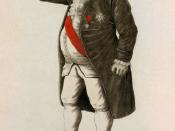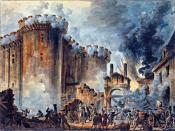France had been ruling under a system where social inequality was prominent and the out-dated absolutism approach of regime in France was becoming less successful; resulting in a radical revolution began by the lower class population. Weary of the manner they were being treated by the upper class citizens and the unfair laws imposed upon them, the third estate began to take a stand and rebel against the system they were under. There were many things that caused them to feel so frustrated, yet all of these problems can be traced back to the social inequality of the state.
Through the enlightenment Louis XVI was the ruler, and during this time the old ways of Absolutism and enlightened despotism was weakening and becoming out of date. Louis was not even able to be fully absolute because of his in general personality, which lacked the strength, prescience, and determination required to successfully be an absolute ruler.
As well as this, Louie was already successor to centuries of custom and tradition in addition to profound class divisions of society. Louis was not the sole blame in this area, because being ruled by a single person was almost hopeless for such a sizeable nation.
A major factor to the change in the way people were thinking that influenced then to act as they did was the enlightenment. Along with the many new inventions came many new ways of thinking as well. Natural rights were proposed by Locke, who believed that people were reasonable by nature and had a entitlement to "life, liberty, and property" as that people should be able to overthrow a king who upset the nation. Books on absolutism that were banned in Paris were published abroad and smuggled into France. Through subtle jokes and satire, criticisms were made clear of...


